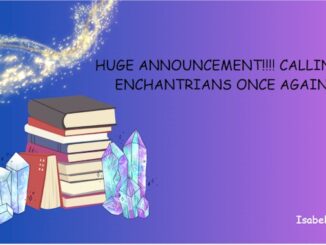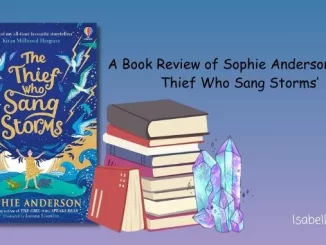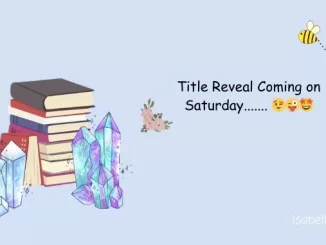
Hello, everyone! Isabelle Knight here again with yet another blog post! So, in the last blog, I shared some of my favorite MG Fantasy book recs for reluctant readers and a few tips! And a few tips on how to find your own. Well, this blog is a slightly more detailed version on that. There will be no book recommendations today (go see the previous post if you want those), but I’ll be giving my guide, tips, and tricks on how to find MG Fantasy books (or books of any genre) for you!
This blog will be a comprehensive guide on finding the perfect MG Fantasy books for you. Also, if you’re wondering why it’s MG Fantasy, just know that you can still use this guide to find the perfect books of ALL genres depending on what works for you. I’m just talking about MG Fantasy because it is one of my absolute favorite genres and one I highly recommend! It has so many appealing things about it! The kid-friendly stories, magic, wonder, whimsy, more magic (I’m obsessed with magic), strong characters, and (of course) AMAZING, action packed adventures! Those are all the things I absolutely love about MG Fantasy, and they’re the reason I write and read it! So without further ado, let’s just stop procrastinating (I tend to do that when writing…) and dive right in!
Understanding What a Reluctant Reader Is
Okay, before we get into all the nitty-gritty stuff of choosing the right stuff, you need to understand what a reluctant reader really is. After all, you can’t exactly find books for a reluctant reader if you don’t know what a reluctant reader is. To put it simply, a reluctant reader is quiet exactly, literally, what the name suggests. A reluctant reader. Someone who’s reluctant to read or just doesn’t like reading or thinks books are boring. And you also have to understand exactly WHY someone is a reluctant reader if you wanna help them.
There are SOOO many reasons that kids dislike reading! And it may be surprising, but even I, the author of a whopping series, was a reluctant reader! Or so I said. Honestly, I’m not even sure what happened. As a kid, I did have a lot of books, but they were mostly kids and toddlers books that I wasn’t extremely interested in at the time which is why I spent so much of my time watching TV and saying that books were boring. But the second I got my hand on a good book (the first ones I got were Ella Enchanted, the ebook version on Amazon Kids and The Cricket in Times Square which came free with a dictionary I bought), I literally finished it within three hours.
So one the main, very key reasons, that kids dislike reading is because they just haven’t found an interesting book yet. And another reason that happens (I think) almost ALL the time is being forced to read. With all the schoolwork and required reading, it makes sense that a lot of kids would dislike reading because they were being forced to do it. Lots of people, including me, really don’t like being told what to do, and being forced to read a book really takes the fun and magic out of it and often gives kids a bad experience with reading, which is why they’d dislike it.
Another reason is that some people have difficulties reading, especially those with ADHD and dyslexia. I personally have never had this, but I’ve heard of it and have seen tons of characters with dyslexia including Percy Jackson and Darrell Rivers (if you haven’t heard of her, she’s from Malory Towers), so I get the sense of how not great that is. Things like dyslexia and ADHD or even just a few learning difficulties make reading seem really difficult and daunting.
And with all the other forms of entertainment, (video games, TV, social media), reading seems pretty boring compared to all those things and all those books stay on their shelves, collecting lots of dust bunnies while kids are literally glued to their screens. (Okay, not literally because that would be pretty bad but you get the message).
All of these are reasons that often make kids dislike reading or see it as boring. One of the ways to get them to enjoy reading would be to find a book that they’d enjoy, a book that engages their imagination and sucks them into a brand new world, a book they can’t put down at all. As I said, I was a reluctant reader too, but the second I got my hands on a book I LOVED, I would absolutely refuse to put it down. I even SLEPT with it! I remember I once stayed up till three am just to finish book one and get started on book two of the Percy Jackson series!
Why MG Fantasy?
As I said previously, there are millions of reasons. Millions. So many I could never list them all. But as I’ve said before, I love all the kid-friendly stories, the magic, wonder, whimsy, more magic, strong characters, and AMAZING, action-packed adventures! Some MG Fantasy books also tend to have a lot of humor in them, like the Percy Jackson series or the Pandava (Aru Shah) series by Roshani Chokshi, which really makes them likable and keeps them interesting, especially for reluctant readers.
I often find that I like MG Fantasy way more than YA because the characters are just so relatable and really filled with a lot of light, hope, and magic which are FANTASTIC elements in a story for anyone to be reading (unless they’re not a fan of magic in which case I would recommend mysteries or maybe sci-fi)!
MG Fantasy also has a lot of action-packed adventures that really grab your attention and keep you hooked until the last page! They have a lot of magic and tend to have really strong writing, and I find that MG Fantasy is extremely good at just sucking you straight into its world and never letting you go, probably because of all the adventure and characters. Plus, the characters in MG Fantasy are usually around the reader’s age or slightly older, which makes them relatable to the reader while also giving them someone to look up to (even if that person is a fictional character)! All of those are the reasons why I, highly recommend MG Fantasy as a genre for kids to read!
Key Elements to Look For
There are a lot of things that come into play when searching for a great book, though I often don’t do a lot of research and just get the book on Kindle Unlimited to see if I like it! However, some of you may do some research, and you do need to take SOME care when choosing a book for someone else, especially for a reluctant reader because you need to find a book that suits them. And you sure don’t want your attempt to fall flat on its face. So here are a few key elements to look for when choosing books for reluctant readers:
1. What Does the Reader Enjoy?
This is important! You need to find a book that you know they’ll enjoy. And yes, sometimes you won’t know exactly for sure, but if you are a close friend or their parent, then most likely you’ll know what they enjoy and all that often channels into what they enjoy reading. For example, if the kid watches a lot of fantasy TV shows, has a lot of fantasy elements in their room (drawings of fairies, forests, mermaids, unicorn, elves, etc. Or even if their room just has that fantasy vibe!), and such then probably they’ll enjoy fantasy like fairies, mermaids, unicorns, elves, and magical forests. If they watch a lot of sci-fi, have that sci-fi element in their room (robots, outerspace, etc.) then it’s pretty likely they’ll enjoy sci-fi books. Take what you know about the reader and use that to figure out which book might speak to them.
This is very important. Don’t just throw them a book because everyone else is reading it or because it’s a bestseller. If you do find an interesting book, try reading a sample (Kindle provides that) or reviews on YouTube or other websites to see if it’s something your kid would like. I recommend reading a short sample because I have gotten a ton of books that I love because I chose to read the sample, including Writing Magic by Gail Carson Levine which absolutely changed my life. The sample will give you a feel of what the book is really like, the author’s writing style, what it’s about, and the characters. If you know nothing about the reader and nothing about the book and throw it to them just because it’s a bestseller, chances are they’re not going to be very interested unless fate is on your side.
2. Engaging Characters
Characters are so important to the book, especially books that are mainly character-driven such as Anne of Green Gables or Mary Poppins. After all, characters are essential to the book. Every good book needs a character for the reader to cheer on and relate to. I recommend finding books with strong characters that have a lot of depth and relatability. If the reader connects with them, they’ll likely be interested in reading the book.
I recommend finding characters who the reader can look up to and also relate to. For example, Percy Jackson is ADHD and dyslexic and has a lot of flaws which the reader can really relate to. But he’s also a hero and has heroic traits that readers can look up to.
I also recommend books with characters who learn and grow and change throughout the book. Even as an author, I’m not exactly sure how or why, but I just feel that that makes the character so much more endearing and the reader really grows and changes along with them. I’ve read some books with really strong character growth and development and I’ve learned a lot along with them. And I’m not kidding, I’ve actually CRIED in those books.
Books with a diverse cast are great too! There are so many people in this world from different races, religions, countries, and cultures and books with diversity that represent all those cultures are amazing and make the characters so much more endearing and relatable, especially if the reader themselves are from a different culture. Trust me, they’ll be glad to find aspects of their own culture in books. However, books with diversity and different cultures can also be a kinda tricky thing too… Honestly, in my opinion, it depends on how you handle it. You’ll want to make sure that your culture/religion is accurately depicted, of course, and luckily, there are many books that do that, especially if the author themselves is from that culture.
A set/collection of books I highly recommend that are diverse and have accurate cultural representations are the Rick Riordan Presents books. If you don’t know what that is, Rick Riordan Presents is basically a branch of Disney Hyperion that invites authors to write and publish books that represent their own culture and the background they come from. They are just like Percy Jackson because they often take mythology and give it a twist and place it into the modern world. There’s a whole range of cultures and countries there – Korean, Chinese, Mexican, Cuban, African, and even Native American! If you want to check out some of these books, just go to Rick Riordan’s website and find the page about Rick Riordan Presents. I’ll link it down below.
Books with characters who have strong friendships and bonds are great too, and I really recommend them! They can help the reader see the aspects of true friendship, working together, and the bond between friends, which is very helpful for kids. I’d recommend these types of books to everyone, but especially to MLP fans. MLP stands for My Little Pony, and their tagline/motto is literally ‘Friendship is magic’. The aspects of friendship just add a sense of hope and warmth to a book!
Good characters often have strong personalities, so look for books that have those characters! I recommend finding books with characters who have strong personalities that are similar to the readers because then the reader will connect and relate to them way more. One example is Anne Shirley from Anne of Green Gables by L.M Montgomery. Anne Shirley is a very endearing character with a very strong personality – she’s curious, imaginative, outgoing, and talks a lot. She is definitely one of the characters I relate to the most and is the reason why Anne of Green Gables is one of my favorite books of all time!
3. Engaging Plot
Plot is another super important element of the book. For MG Fantasy books for reluctant readers, I recommend fast, quick-paced plots with a lot of wit and humor. I find that the quick pace mixed with the wonder, fantasy, and humor, just really catches the reader’s attention and keeps them hooked until the last page. Kids, especially those with a short attention span, will enjoy books that have a relatively quick pace. Quick pacing snags their attention, especially with cliffhangers because they’ll immediately want to know more. They’ll worry about what’s going to happen to the main character and keep turning the pages. So look for books with fast-paced, intriguing plots.
4. Relatable Themes
If you don’t know what a theme is, it’s sort of like… what the book is about. But not like the plot or character. More like the lessons, what feeling the book really gives. Such as themes of loyalty, bravery, friendship, family, kindness, and I could go on and on and on and ON over this.
Themes are such an important part of books. They are literally the book’s heart and soul, and relatable themes make a book so much more intriguing to the reader. They create a really powerful connection between the reader and the story, perfect for transforming a reluctant reader into an avid one! Themes that the reader can relate to often help see themselves in the story. There’s a connection between the story’s heart and theirs, and they can often inspire readers to be bold and face their fears, especially books with strong themes of bravery and loyalty.
So find a book with relatable themes. If the reader is shy, maybe try finding a book with themes of bravery and courage about a reader who is also shy. Explore various genres and just see what works for you!
Tips for Encouraging Reading/Getting Kids to Like the Books
Before we leave (wow, this is turning into a pretty big guide. When I said it would be more detailed, I didn’t realize I meant THIS detailed) here are a few additional tips for encouraging reading!
1. Don’t Force Them to Read
This is often one of the very key reasons people hate reading: They’re being forced to read. They aren’t given a say in the matter, and they have to do it, no matter what. That is the absolute perfect recipe for turning something enjoyable into a tedious chore. No one likes being FORCED to read, and with all the required reading in schools, this might have given the reader a bad experience with reading.
Instead, take the reader to a nearby bookstore or library (one that lets you flip through the books) and let them browse. Don’t force them to read, but lightly tell them to just browse among the books for an hour or half an hour and see if they find one that seems even remotely interesting. Or just have them find a book with an amazing cover they like. Gently encourage them to read the first page. Just the first – the very first – stinkin’ page. (And by that, I mean the start of the story. Not the title page, dedication, table of contents, or copyright). See if they like it. If they don’t, don’t force them to read it. Put the book down and go explore some more books! Let them find books that they’d like to read. If they do find an interesting one, then they will likely want to read it. Don’t force them to read it. Let them know that they have the choice to read that book or not and if it gets boring, they don’t have to finish it.
And if you’re choosing a book for them do the same and do what I said in the previous sections. Trust me, it’ll make all the difference.
2. Cozy Reading Spaces!
I absolutely love cozy reading spaces! They’re just so private, warm, and calming and just absolutely wonderful places to be to read a book! And having can make reading really fun, even for reluctant readers! I have my own very cozy, warm room, though I can read a book just about anywhere (not in the car, though. It makes me dizzy), and the story just drags me into its world. But cozy reading spaces are still fun to have, and they aren’t super hard to get! Just find a cozy place where you feel comfortable, snuggle up with a blanket or stuffed animal and get reading! Having a space that’s just yours where you can read at your own pace gives you the freedom to explore the book world and get lost in it! At your own pace without the whole pressure of a deadline. There isn’t really that much more to say about this.
3. Audiobooks
For kids who have trouble reading, such as those with dyslexia, audiobooks are a great way to help them! There isn’t the struggle of trying to make out all those twisting, dancing, floating words, and if the narrator is great, then you’ll likely get dragged into the story! They can just lay back on the sofa, stare up at the ceiling and listen to the narrator’s voice! The only downside is that audiobooks are a bit slower and can take a longer time to finish.
That’s the End
Well, that’s the end of this surprisingly and probably over-comprehensive guide to helping reluctant readers. I have compiled nearly all of my reading knowledge into this, and I desperately truly hope this helps! Also, don’t forget to check out my YouTube channel and my books, Enchantria: Guardian’s Heir and Enchantria: Sun and Flame. Also, definitely check out the posts on my YouTube channel. Something important (severely important) is coming, and the clues are all on there! Wouldn’t want you to miss out! Thank you all so much for coming, and I’ll see you all again soon! Bye!
Isabelle





Be the first to comment